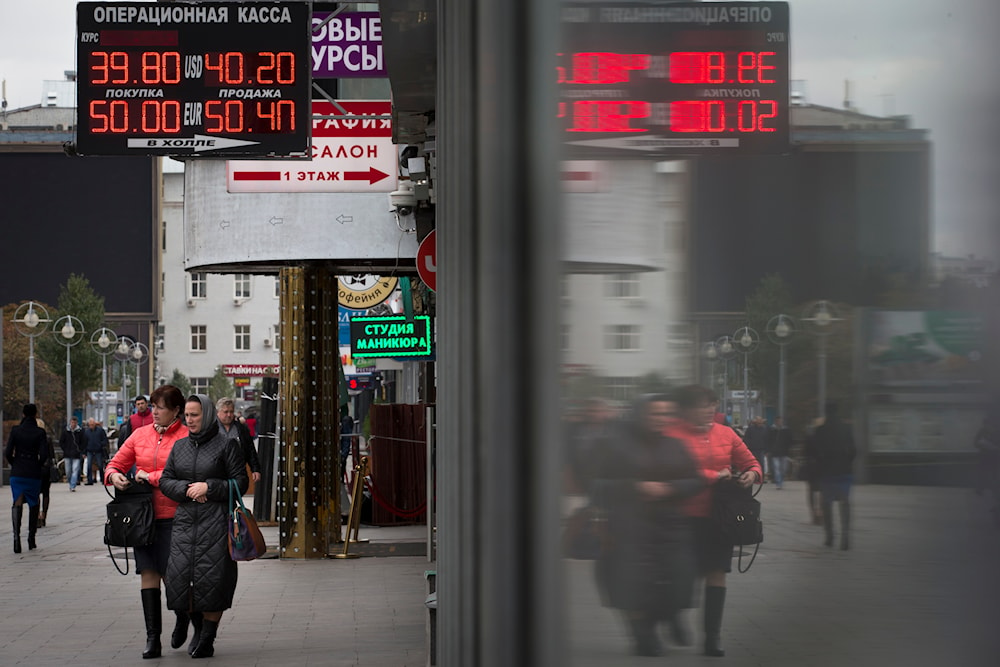Mali looks into using Russia's Mir Cards: Malian Official
Mali expresses interest in using cards from Russia's Mir payment system, with plans to enhance cooperation between the two countries.
-

People walk past money exchange offices in Moscow, Russia, on Monday, October 6, 2014. (AP)
Mali is interested in utilizing cards from Russia's Mir payment system, expressing Bamako's desire to enhance the existing level of cooperation with Russia, as stated by Badra Alou Coulibaly, Mali's general controller of public services, in an interview with Sputnik.
In response to a relevant question, Coulibaly said, “We are certainly looking forward to this. We want this because cooperation between our countries has already reached a significant level. We want to develop it."
Mir payment system cards are now accepted by partner banks in Abkhazia, Armenia, Belarus, Vietnam, Kazakhstan, Kyrgyzstan, Tajikistan, South Korea, and South Ossetia.
Also, Iran, Indonesia, Myanmar, Egypt, Thailand, India, Venezuela, Mauritius, Nigeria, and Ethiopia expressed interest in integrating Mir cards into their systems.
Earlier last month, Russia and Venezuela were exploring avenues for the use of digital payment mechanisms in trade to secure transactions against Western interference, Russian Deputy Prime Minister and Minister of Trade Denis Manturov said on March 4.
"[Russian payment system] Mir is one of the alternatives, enabling both our and the Venezuelan people to make daily payments with the use of these cards. In addition to the population, payments should be made possible between businesses, and commercial entities," Manturov told the Knowledge First education forum when asked about how Russia is cooperating with Venezuela.
Russia-Mali ties
Last year, during a press conference with Russia's Foreign Minister Sergey Lavrov in Bamako, Malian Foreign Minister Abdoulaye Diop stressed the necessity to strengthen bilateral ties with Russia in economic matters and opposed Western-led sanctions which are aimed at intimidating African countries from conducting trade operations with Russia.
"Russia will make important decisions to transfer grain, energy, and fertilizers to our country ... We will work together to strengthen trade cooperation, economic ... Mali opposes any sanctions ... And we also will not support sanctions imposed on other countries," Diop told reporters.
On his part, Lavrov predicted that bilateral cooperation in military and military-technical spheres would be attaining new heights this year.
Decreased confidence in the dollar
This week, Federal Reserve Board of Governors member Michelle Bowman stated that while the US Federal Reserve is keeping an eye on the price of gold, it is not prioritizing it over other indicators. This comes as the price of gold recently increased by 0.42%, reaching a historic high of over $2,153 per troy ounce, as reported by trading data earlier this month.
The historic increase in the price of gold held significance due to its nature as a dollar-denominated asset. When the value of gold rises, it often indicates a decrease in the value of the dollar.
That said, an increase in the price of gold can reflect various factors, including a loss of confidence in the dollar. When investors perceive higher risks or uncertainties associated with the dollar, they may seek refuge in gold as a safe-haven asset, thus driving its price up.
As the West contemplates the unlocking of Russian assets, many are questioning the future of the dollar's dominance in international trade.

 3 Min Read
3 Min Read








